Have ants invaded your tomato plants? You’re right to think that there’s probably something to worry about, but it’s not them.
Ants usually don’t harm tomatoes, but they might indicate that other pests are present.
In this way, they are actually helpful as a signal that something must be done.
Most likely, your initially healthy plants are having aphid infestations, or whiteflies, and ants have been lured by them to your tomatoes.
Ants rarely damage the tomato plants themselves. On the contrary, they actually have benefits like defending plants from other pests.
It stands to reason that the best course of action is to take care of the actual insects that are causing damage to your tomato plants.
When the ants won’t find their sources of food anymore, they will simply move somewhere else.
If you really can’t stand to have ants in your garden, there are also methods to deter or repel them without killing them.
- Related article: Ants Eating My Plants
Read on to discover the most efficient and effective solutions to keep these crawly critters off, plus their side effects.
Are Ants on Tomato Plants a Problem?
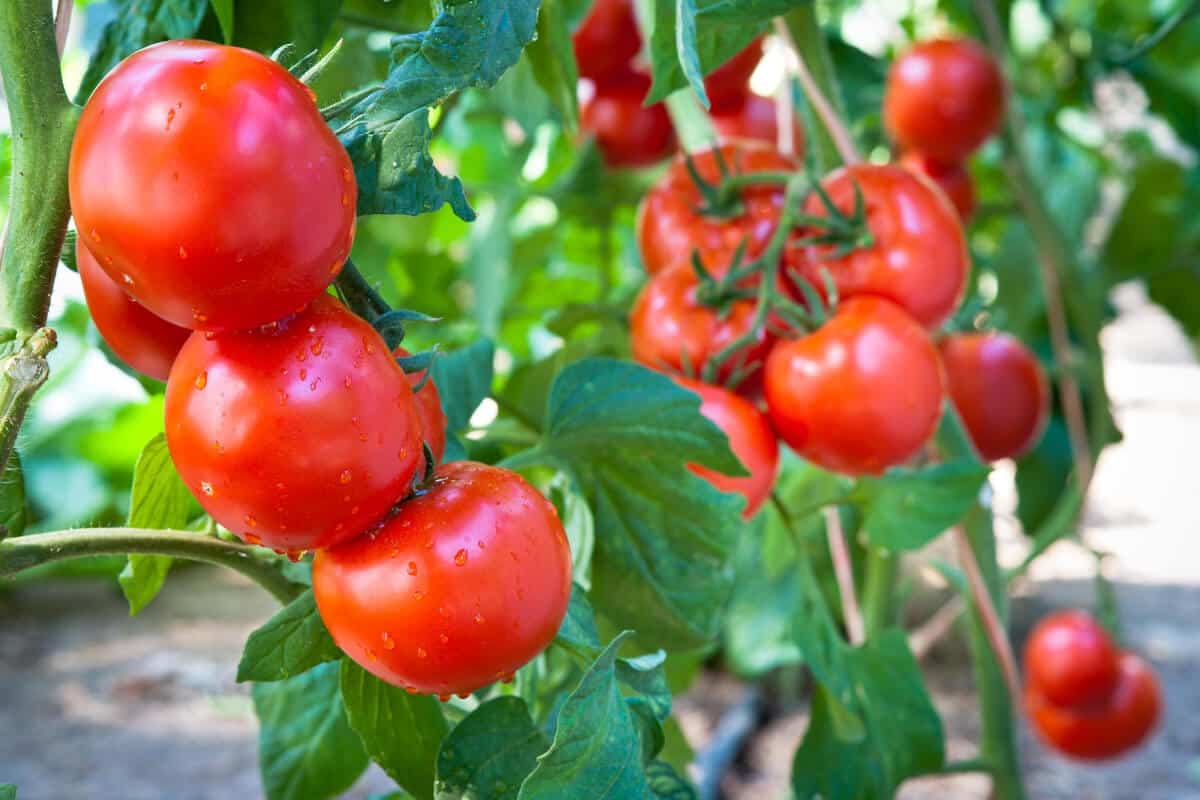
Ants aren’t normally a problem on tomato plants, at least by themselves.
The damages they cause are due to the fact that they encourage the presence of aphids.
Ants have learned to farm aphids, much like we do with our domestic animals—they protect them and sometimes move them to better locations which are more secure and with more food.
Aphids feed from the sap of plants, and they especially like tomatoes.
You will easily recognize them because they form clusters underneath the leaves—they are tiny and usually green or brown in color.
Ants are very attracted to them because aphids suck much more sugary sap than they are able to digest.
Their sugary excretions are therefore very sweet and nutritious, and ants literally milk them to gather this sugary substance called honeydew.
Honeydew on tomato plant clearly shows the efficient symbiotic mutualistic relationship between these two insects that ants arrive shortly after aphids infest your plants, and they help their population to grow exponentially.
If you see leaves that have yellow spots or have withered, the aphids on tomato plants are the problem, even if the plants are crawling with ants.
In this case, you won’t want to ignore them as they can cause great damage if left unchecked.
Will Ants Eat Tomato Plants?
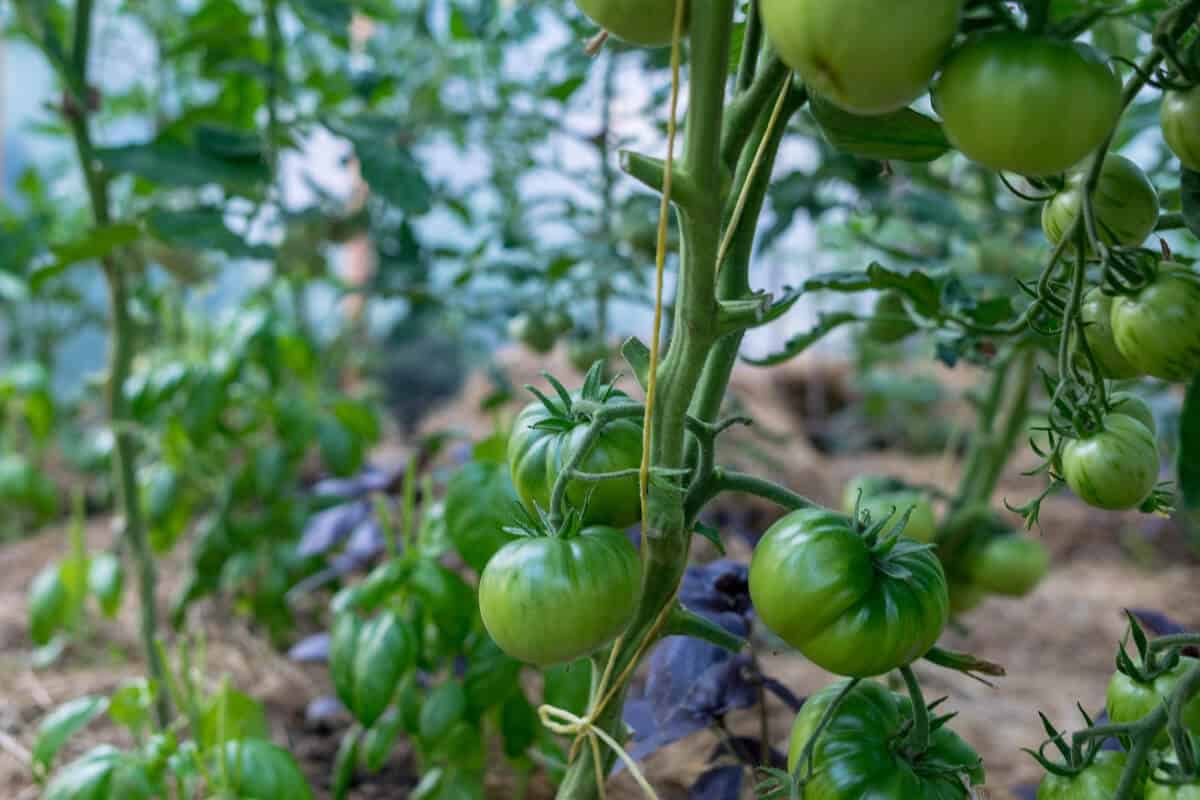
It’s unusual for ants to eat tomato fruits. If you see damage on your tomato plants, it’s most likely due to other pests, which could be a variety of insects or other animals that cracked the skin open.
In this case, you might see the ants feeding from the tomatoes, but they are just taking advantage of the situation.
If you don’t see any other insect, it’s possible that the tomatoes have cracked for some other reason (either radial or concentric cracking), again providing an entry point for ants.
However, there is a species of ant that can cause direct damage to plants by removing the leaves—the Leafcutter Ants, which need the greens to grow a fungus which is their only food source.
You will recognize the damage they cause because small pieces of leaves will be neatly cut off. Leafcutter Ants rarely cause serious damage to tomato plants, tough.
How Can Ants Help Tomato Plants?
Despite the fact that they help the aphid population to thrive, ants can also be really helpful for your tomato plants.
Here are some of the ways ants help tomato plants:
1. Ants Take Care of Pests
Ants are natural predators of many harmful insects.
They are an important part of your garden as they help you stop infestation of pests and to control the population of termites, caterpillars, and fleas.
They feed from the eggs and larvae of these insects, ensuring that these tomato pests won’t be able to damage your tomato plants.
2. Ants Are Pollinators
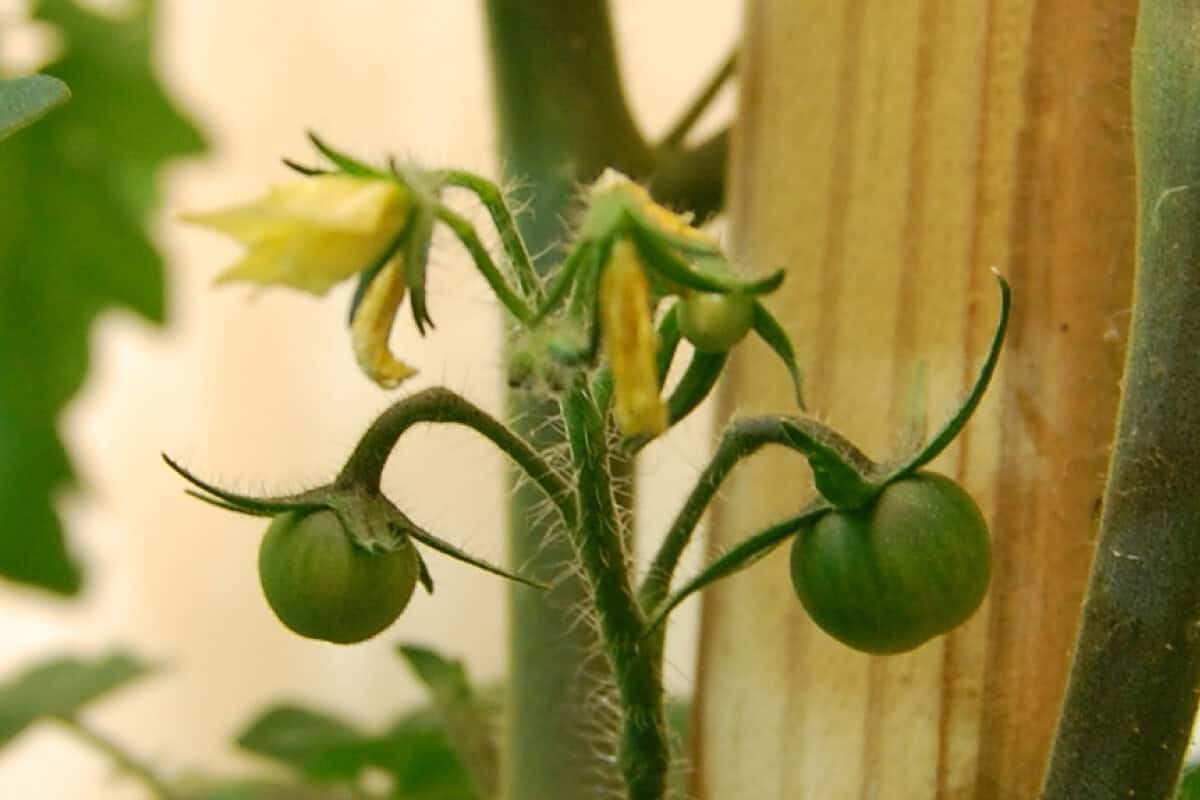
These insects are well-known for being hardworking, and this can turn to your advantage.
As they constantly move from plant to plant, they transport the pollen from one to another. They’re much like bees in this way, even if less efficient.
Ants also help plants to spread as they feed from the outer shells of many seeds and leave the rest in the soil.
3. Ants Improve The Soil
Ant colonies live in galleries they excavate in the soil. This can be beneficial because it allows air and water to spread more efficiently throughout the different layers of soil.
In this way, the roots of your tomato plants will have easier access to oxygen and moisture.
4. Ants Decompose Organic Waste
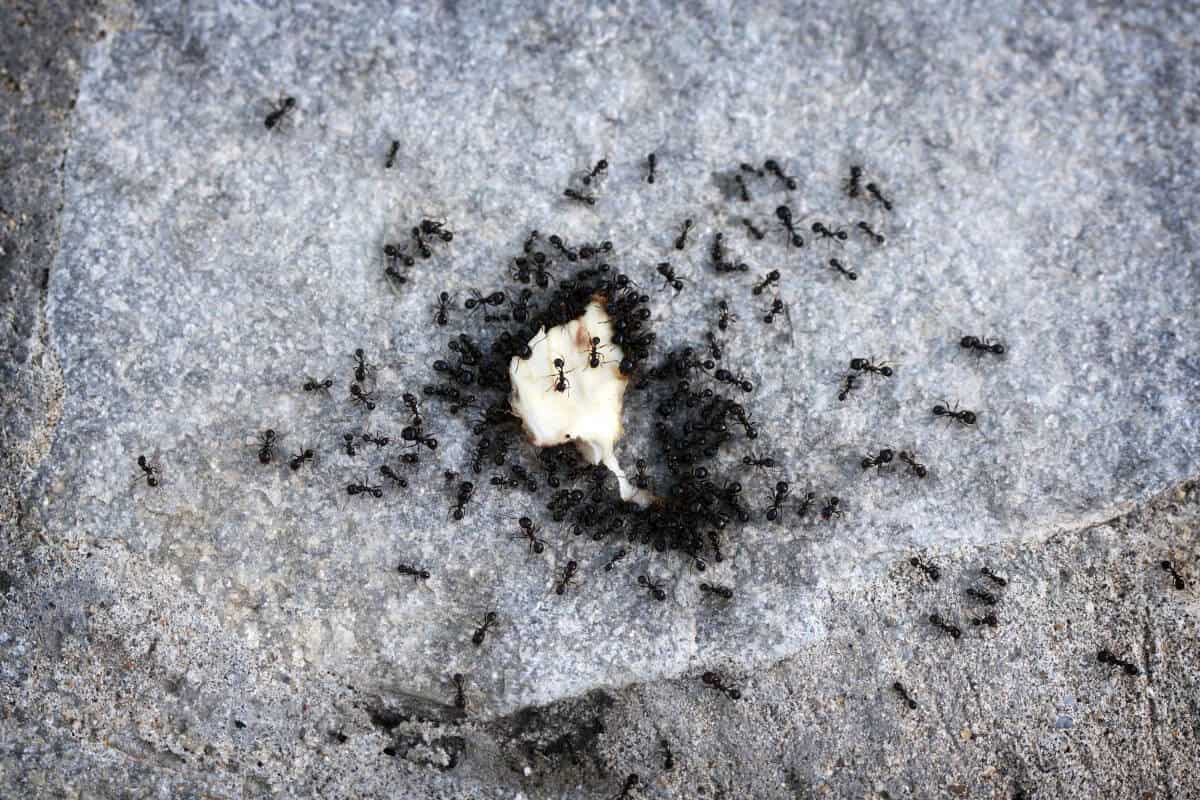
Ants are responsible for the first step of the decomposition process.
This means that plant material and dead insects won’t accumulate in your garden since they will be taken apart and carried away.
What remains after ants have done their part will get further decomposed by microorganisms, such as fungi and bacteria.
This process allows important nutrients to return to the soil, fertilizing it.
Best Ways to Keep Ants Away from Tomato Plants
Since ants aren’t really a problem for tomato plants, it’s advisable to use natural methods to deter them, instead of killing them.
In fact, we won’t talk about methods to kill an entire colony of ants in this article, such as organic insecticides or the use of bands of Diatomaceous Earth, as they are not necessary to protect your tomato plants.
The best option is to take care of the actual pests that are probably infesting your tomatoes.
If you see just a few ants on plants, there might be nothing to worry about, but a whole lot of ant population is a sure sign that something’s wrong.
1. Repel Aphids and Whiteflies
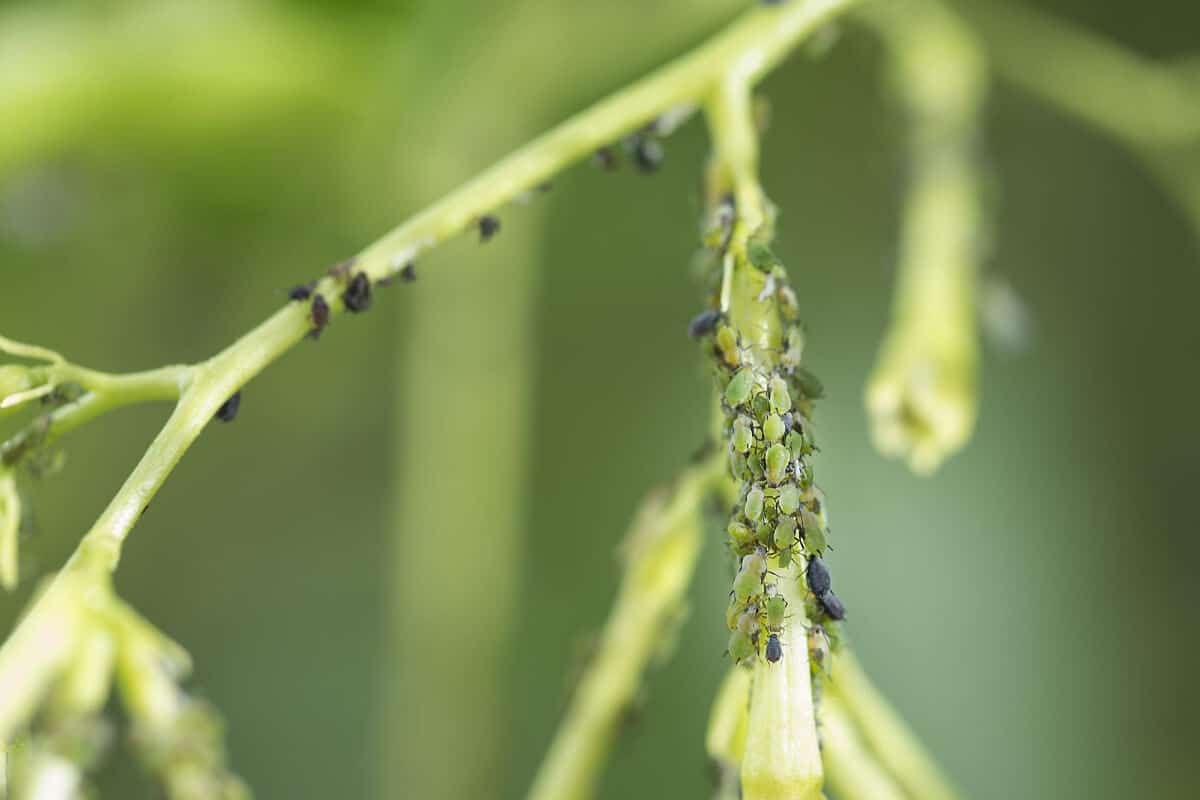
When the tomato plants are still young, you can keep flying insects away by placing an aluminum reflective mulch around the plants.
This will need to be kept free of debris so that by reflecting the sun, it will repel the insects.
2. Blast Aphids with Water
This method works for aphids that don’t fly. Since they move very slowly, by spraying them with blast of water from a hose or a spray bottle, you can ensure they won’t come back to your plants.
It would need to be repeated at least once a week, better if more often, as it is quick and easy.
Since ants thrive in dry environments, cups of water—hot water, soapy water, water with white vinegar, distilled water, boiling water, it doesn’t matter—you may use them around your plants as ant deterrent solution.
Another result of this is that you will also get the ants off your plants without killing them, so it’s a great way to get rid of them if you simply don’t like them around the garden.
3. Create a Barrier Around the Plants
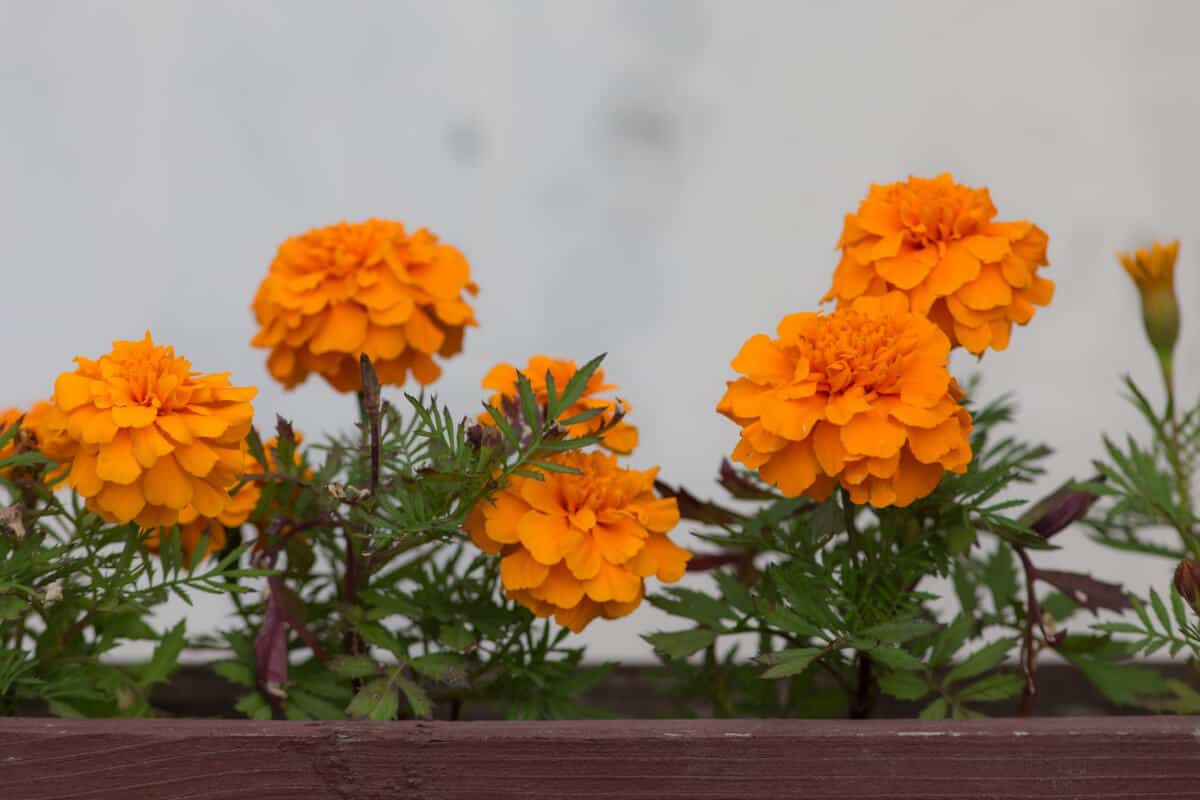
Many spices and flowers have strong odor that ants can’t stand.
You can ensure that the ants will stay away simply by planting Marigolds, Basil, or Lavender next to your tomato plants.
Plus, these plants have the added benefit of being excellent companion plants for tomatoes, which will help them to thrive and grow sweeter and better-tasting fruits.
Some spices also work to deter ants such as cayenne pepper, cinnamon, and curry. You can sprinkle these around your plants, or place cinnamon sticks directly in the soil.
Other homemade barriers with strong scents such as orange peels, citrus peels, lemon peels, coffee grounds, cloves of garlic, lemon spray, black pepper spray, apple cider vinegar, and mint leaves work too.
4. Divert the Ants
Ants are extremely attracted to anything sweet. You can use this to your advantage by baiting them with a piece of fruit placed in a pot.
Many ants will congregate there, lured by the easy food.
Check the plants in pots often and eliminate the ants that have gathered there or, even better, simply move these ant-covered fruit slices somewhere else.
In this way, they won’t disturb you but will continue to do their essential role for the balance of the ecosystem.
Ants on Tomato Plants Final Thoughts
Ants can be beneficial insects and effective in biological pest control for tomato plants, but if you don’t want them around, there are several natural methods for keeping them away.
These include setting up an aluminum reflective mulch barrier, blasting aphids with water, planting spices and flowers with strong odors next to the tomatoes, and baiting them with sweet fruits.
By using these strategies, you can become an expert gardener and deter these ants off, keep your tomato plants healthy, prevent further problems in your garden beds, and have a bountiful harvest of tomatoes!
Learn more about ants on tomato plants by checking these articles:
- Ants in the Vegetable Garden
- Red Ants on Pepper Plants
- How to Get Rid of Ants on Strawberry Plants
- Ants Eating Cucumber Plants
- Ants on My Okra Plants
- Ants on Zucchini Plants
Sources:
- https://uwm.edu/field-station/ants-in-my-plants/

